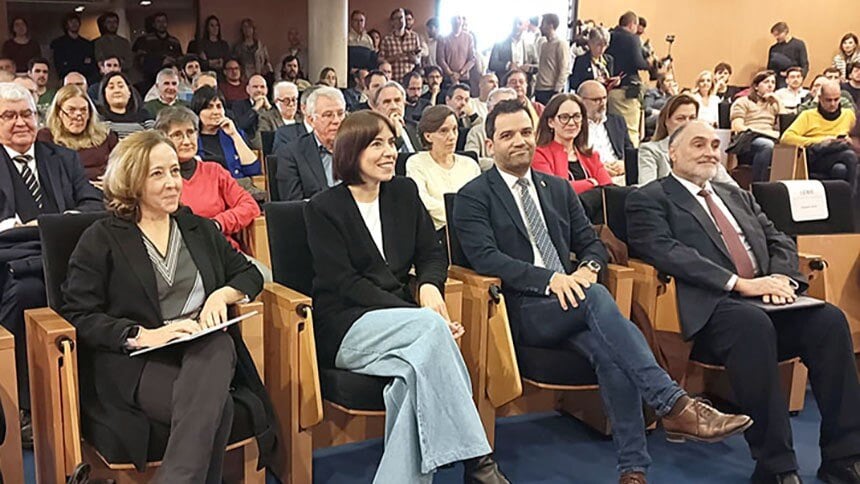With the transfer of land from the University of Valencia to CSIC, which took place this Friday at the UV Science Park, the project to build the first compact linear ion accelerator in Spain began. Promoted by the Institute of Corpuscular Physics (IFIC), the equipment is based on hadrontherapy, a radiotherapy technique that is shaping up to be one of the most effective for cancer treatment in the future. The Minister of Science, Innovation and Universities, Diana Morant, attended the ceremony together with the president of CSIC, Eloísa del Pino, and the vice-rector of Research of the UV, Carlos Hermenegildo
This is the start of this innovative technological project that will be hosted by the Institute of Corpuscular Physics (IFIC) and represents a commitment to the future of cancer therapy developed in Spain. The project, whose construction is financed by the Center for Technological Development and Innovation (CDTI) through a Pre-commercial Public Procurement (PPP) process and an agreement with the CSIC, has a budget of almost 22 million euros and responds to two challenges. On the one hand, to develop the technology of compact linear accelerators with ion beams, with the collaboration of Spanish companies and public research organizations; and on the other hand, to carry out radiobiological studies that are unique worldwide. The project will be built in the facilities of the UV Science Park, near the Burjassot-Paterna campus.
Minister Diana Morant has explained the importance of combining public and private efforts when it comes to innovations. “In our country, we are making the largest investment ever made in the research of diseases that affect us so much, such as cancer. We are talking about high-financial-risk technologies because we are talking about innovation, and where the market does not reach, public investment must step in,” she said. “This is why it is so important to value the public science of our country, because, through the taxes of all citizens, we are going to be one of the first countries to research a technology that, without a doubt, will be the future and the hope for many people with cancer,” concluded the Minister of Science, Innovation, and Universities.
“This carbon-ion project has a significant social scope, and the CSIC is deeply committed to its realisation, combining efforts from science, technology, and public-private cooperation for its final implementation in Spanish healthcare and its fight against cancer,” added Eloísa del Pino, President of the CSIC.
The Technology
The treatment of tumours with protons, known as proton therapy, is already a reality being implemented in Spain. It allows the modulation of irradiation on tumour tissues with great precision and less invasiveness compared to conventional radiotherapy. However, ion therapy – which uses electrically charged atoms heavier than protons – offers greater radiobiological effectiveness, lower toxicity, and a more favourable immune response.
The new ion accelerator will, initially, advance the evaluation of the impact of hadron therapy. It will enable the modelling and systematisation of ion behaviour, the study of new dose deposition techniques, the analysis of the complementarity of different radiation energies, and the comparison of effects depending on the type of ions, among other aspects. Additionally, the project will address the first stage of the biomedical studies required to develop a clinical ion therapy programme.
“In our country, we are making the largest investment ever made in the research of diseases that affect us so much, such as cancer. We are talking about high-financial-risk technologies because we are talking about innovation, and where the market does not reach, public investment must step in.”
The Building at the Parc Científic de la Universitat de València
The construction of this building on an 8,500-square-metre plot, whose handover was formalised on Friday, 13 December, is expected to begin in 2025. By 2027, the facility will be able to incorporate various parts of the injector for assembly, adjustment, and review, and it is anticipated to become operational by the end of 2028.
“The Universitat de València and the CSIC have been working for many months on this important project, and today’s event represents a significant step in the development process of a cutting-edge scientific facility at a joint research centre,” said Carlos Hermenegildo, Vice-Rector for Research at the UV. “In this alliance, the Universitat not only provides the land for the installation of the ion accelerator, but it also commits, through the IFIC, to the scientific development of the accelerator and the exploration of its applications in both basic and applied science, such as its potential use for treating oncological diseases,” he said.
With a budget of €21.8 million funded by European Regional Development Funds (FEDER 2021-27) provided by the European Union, the project has a five-year execution period. The CIEMAT (Centre for Energy, Environmental and Technological Research) and the Spanish company AVS, which specialises in scientific industry, are also involved in the construction of the facility.
The main institutions involved have already signed collaboration agreements to work on this project, which also benefits from the advice of CERN, the world’s largest particle physics laboratory. Additionally, a team of medical advisors, consisting of radiation oncologists, has been established to guide the medical aspects of the project.
Source: UV Notícies
Recent Posts


